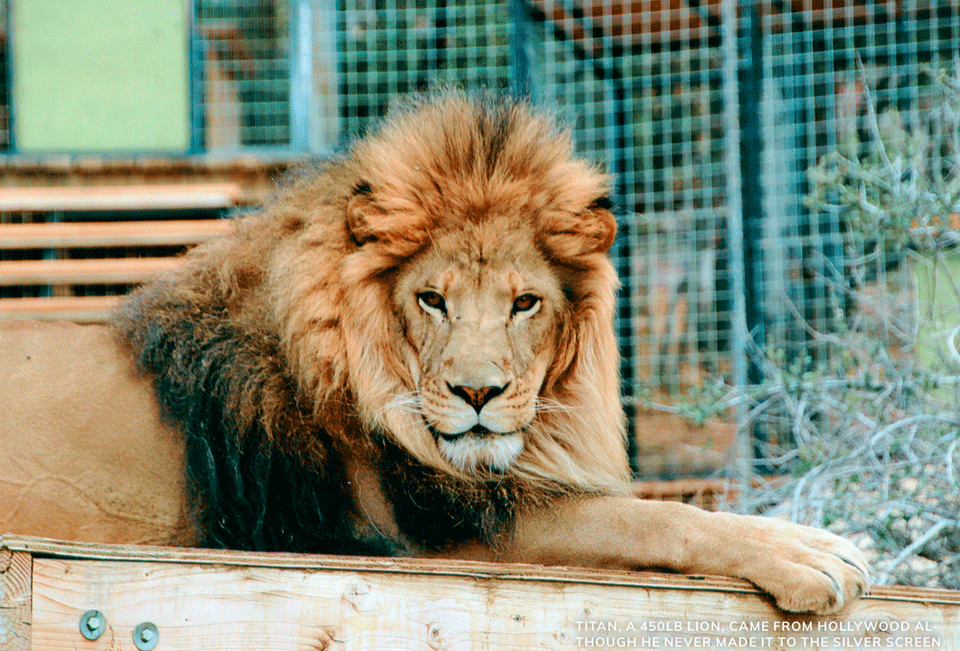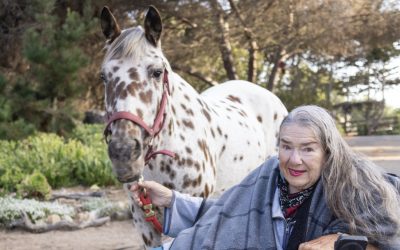It isn’t a zoo or a sanctuary for animals. Instead it’s an innovative park dedicated to the preservation of wild cats. It’s called Project Survival Cat Haven. Located on 106 acres at Dunlap, Calif., just west of Kings Canyon National Park, it specializes in educating the public about the plight of endangered cats and helping to raise funds for the conservation of them in the wild.
Cat Haven opened in 1993. Dale Anderson is the founder and director. It provides excellent homes for all of its 36 small and large cats. These include lions, tigers, jaguars, cheetahs, leopards, mountain lions, bobcats, lynx, wild African cats and several other species. The cats come to the haven through trades, births, purchases and donations. The donations are from zoos and birthing centers in Africa, Central America and the United States. Hollywood trainers have provided several cats. Some of these are stars that have appeared in commercials, films and television shows.
Anderson is committed to the importance of conservation and doesn’t feel zoos have been doing enough for the animals in the wild. “Zoos tend to look inward at what’s happening to the animals in their facilities, not beyond. We, on the other hand, look outward to the wild to see what we can do to assist the researchers in the field. That’s what makes our work so meaningful,” he stated.
Cat Haven currently funds conservation projects in Central and South America, Africa and Asia. These include providing radio collars and camera traps to monitor the cats’ movements and populations, supplies, vehicles and specialized equipment. The staff also tries to help mitigate any difficulties that may arise between the cats and local populations.
“Recently, we assisted some villagers in Nepal. They were having problems with snow leopards killing their animals. They tried high fences, but the cats jumped over those. We constructed a roof on the enclosure to keep the cats out. It worked and they were delighted,” he said.
In order to fund these outreach projects, the staff conducts several fund-raising programs. It offers technical classes about the cats, such as anatomy, genetics, ecosystems and tracking methods, and fun ones, like animal crafts. Detailed information about the cats is given during the one-hour tours.Approximately 15,000 of these tours are given yearly.
One popular outreach program is Coins for Cats. This involves bringing cats to public schools. The children learn about the cats and get a close look at them. There are three cheetahs that generally make the visits. They are Tango, Jazz and Salsa. The cats, called ambassadors for conservation, love the attention they get from the kids. The students also learn about the research projects underway in the wild. They are shown videos and given the opportunity to choose a project they might like to support with their coins.
The researchers then contact the students to give them more details about the project and explain how their coins will be used. Regular progress reports are given the children.
“This is a wonderful way for the children to make a real connection with the cats, not just an abstract one,” Anderson stated. Currently schools throughout California are involved in the Cats for Coins program.
There is a $500 charge for a cheetah visit to a school, or a $175 charge for a visit of a small cat, such as a bobcat or lynx. There are other opportunities to support the park. You can go for an hour walk with a cheetah for $100, spend a day with one for $600, or help feed a lion for $75. Anderson also hosts a yearly 12-day African safari for $7,450. The park is open year-round but has different hours for winter and summer. Cost is $15 for adults, $12 for seniors, and $10 for children 4-10 years Additional information is available on its web site www.cathaven.com or by calling (559)338-3216.
Project Survival Cat Haven provides ample opportunities for the public to observe and learn about wild cats, and help researchers in their efforts to protect and conserve these beautiful animals. It’s worth a short trip to the Central Valley.





